2020届英语中考语法专项复习:情态动词(共35张PPT)
文档属性
| 名称 | 2020届英语中考语法专项复习:情态动词(共35张PPT) |

|
|
| 格式 | zip | ||
| 文件大小 | 2.5MB | ||
| 资源类型 | 教案 | ||
| 版本资源 | 通用版 | ||
| 科目 | 英语 | ||
| 更新时间 | 2020-05-11 18:27:14 | ||
图片预览


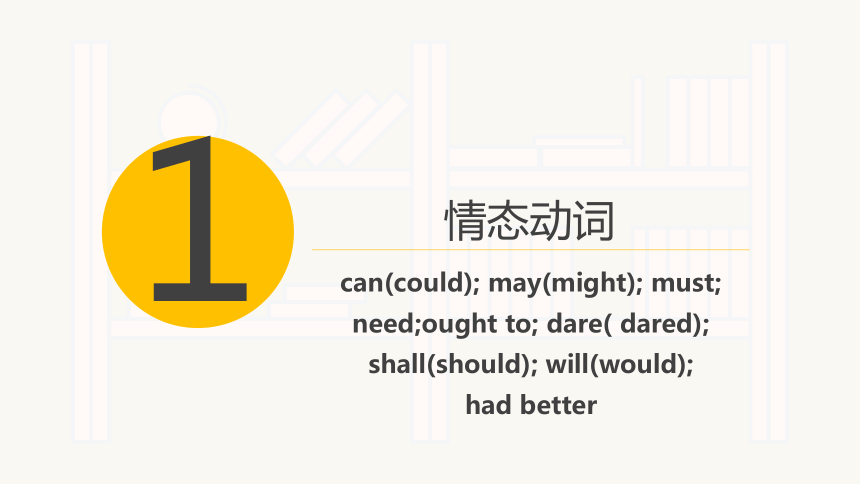
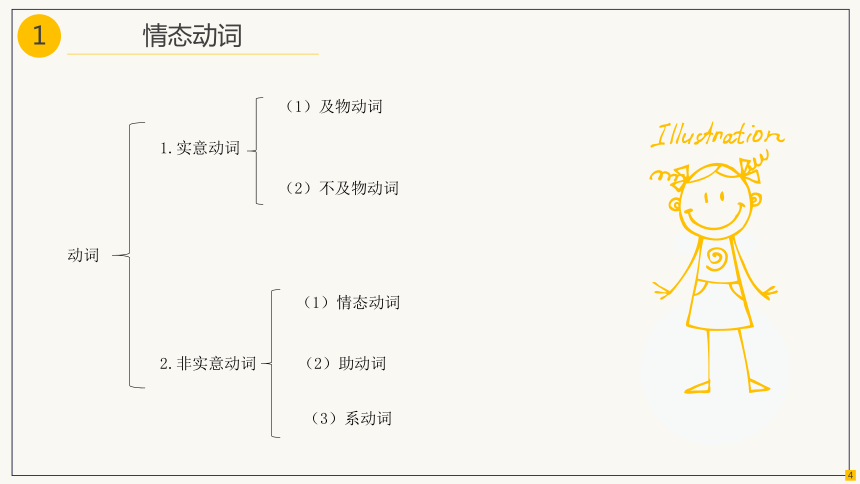

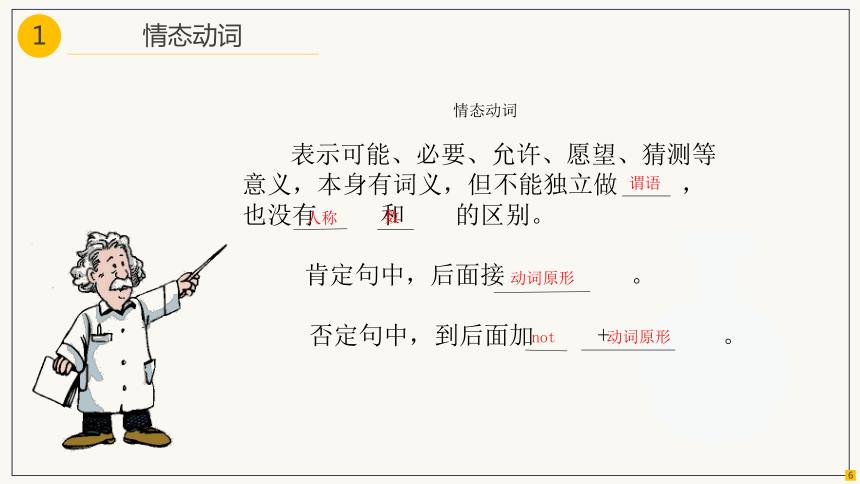
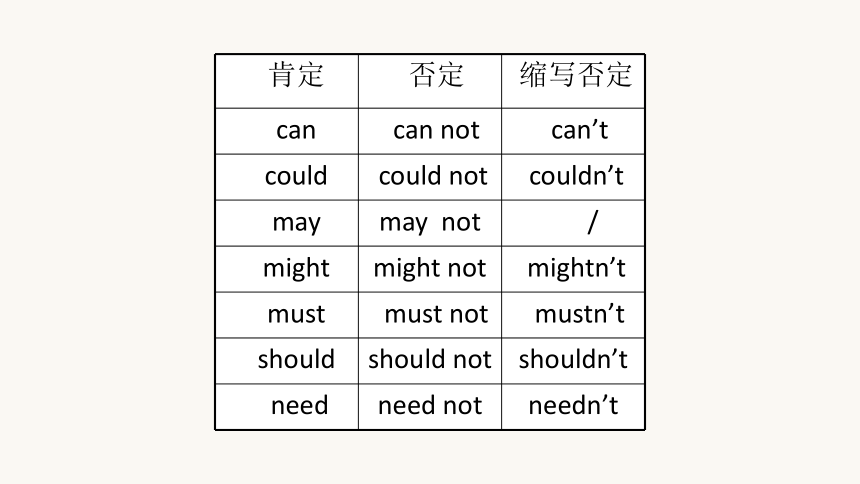
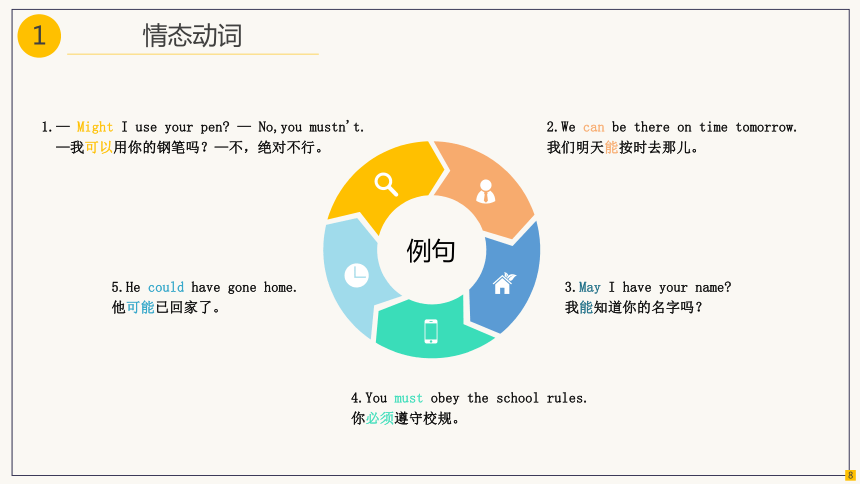
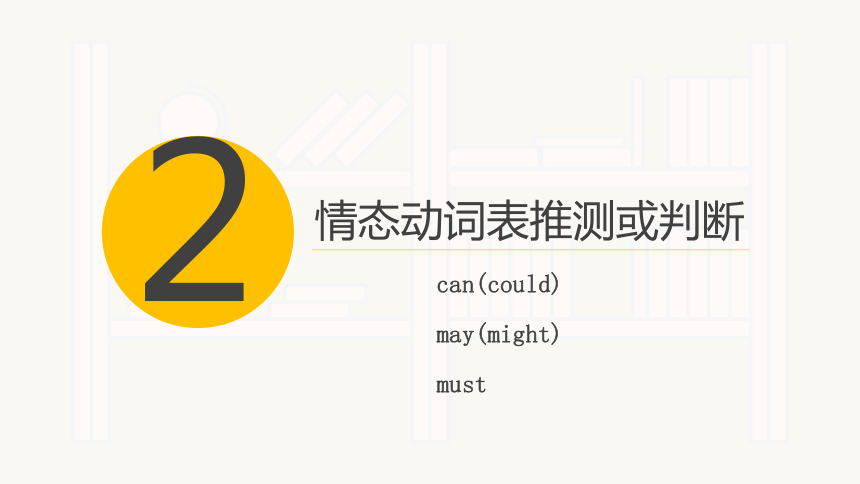
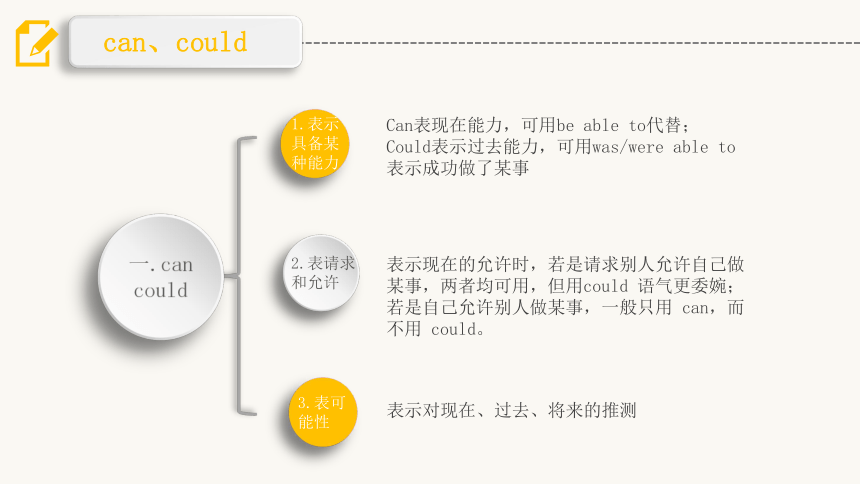
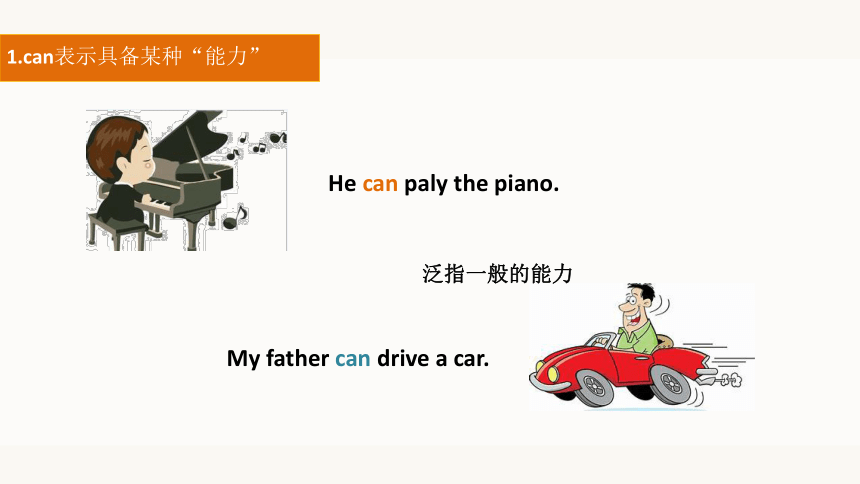
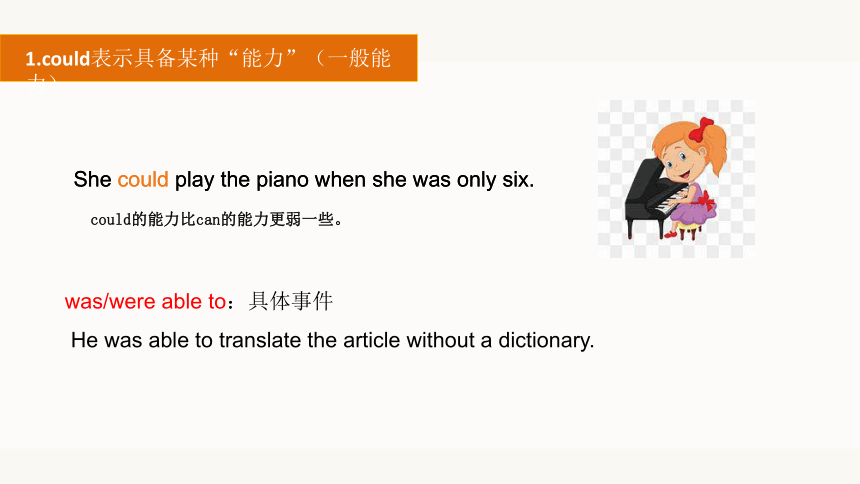
文档简介
(共35张PPT)
情态动词(Modal Verbs)
CONTENTS
目录
情态动词
巩固练习
情态动词表推测或判断
情态动词表推测对比
1
2
3
4
情态动词
1
can(could); may(might); must;
need;ought to; dare( dared);
shall(should); will(would);
had better
情态动词
1
*
动词
1.实意动词
2.非实意动词
(1)及物动词
(2)不及物动词
(1)情态动词
(2)助动词
(3)系动词
情态动词
1
*
只做情态动词
1
可做情态动词
又可作实意动词
具有情态动词特征
可做情态动词
又可作助动词
2
3
4
情态动词(Modal verbs)本身没有一定的词义,表示语气的单词。但是不能独立作谓语,只能和动词原形一起构成谓语。情态动词用在行为动词前,表示说话人对这一动作或状态的看法或主观设想。
may(might)
must
need
dare
can
ought to
shall(should)
will(would)
社会捐赠款物协议书模板样本
合同编号:_________
甲方(捐赠单位):_________
乙方(接受捐赠单位):_________
甲方向乙方捐赠人民币_________(大写)元,物资_________,折合人民币_________(大写)元,专项用于_________地区_________。具体捐赠意向如下:
┌────────┬────────┬───────────┬──────┐
│指定捐赠单位│捐赠资金│捐赠物资折现│合计│
├────────┼────────┼───────────┼──────┤
│││││
├────────┼────────┼───────────┼──────┤
│││││
├────────┼────────┼───────────┼──────┤
│││││
├────────┼────────┼───────────┼──────┤
│││││
├────────┼────────┼───────────┼──────┤
│非指定捐赠││││
├────────┼────────┼───────────┼──────┤
│合计││││
情态动词
1
*
情态动词
表示可能、必要、允许、愿望、猜测等意义,本身有词义,但不能独立做 ,也没有 和 的区别。
肯定句中,后面接 。
否定句中,到后面加 + 。
谓语
人称
数
动词原形
not
动词原形
肯定 否定 缩写否定
can can not can’t
could could not couldn’t
may may not /
might might not mightn’t
must must not mustn’t
should should not shouldn’t
need need not needn’t
情态动词
1
*
例句
1.— Might I use your pen? — No,you mustn't.
—我可以用你的钢笔吗?—不,绝对不行。
2.We can be there on time tomorrow. 我们明天能按时去那儿。
3.May I have your name? 我能知道你的名字吗?
5.He could have gone home. 他可能已回家了。
4.You must obey the school rules.你必须遵守校规。
情态动词表推测或判断
2
can(could)
may(might)
must
can、could
1.表示具备某种能力
2.表请求和允许
3.表可能性
Can表现在能力,可用be able to代替;
Could表示过去能力,可用was/were able to 表示成功做了某事
表示现在的允许时,若是请求别人允许自己做某事,两者均可用,但用could 语气更委婉;若是自己允许别人做某事,一般只用 can,而不用 could。
表示对现在、过去、将来的推测
1.can表示具备某种“能力”
He can paly the piano.
My father can drive a car.
泛指一般的能力
1.could表示具备某种“能力”(一般能力)
She could play the piano when she was only six.
could的能力比can的能力更弱一些。
was/were able to:具体事件
He was able to translate the article without a dictionary.
She could play the piano when she was only six.
2.can、could表示请求和允许
Can \Could I come in?
2.can、could表示请求和允许
“Could \Can I use your pen? ” “Yes,of course you can.”
“我可以借用你的钢笔吗?”
“当然可以。”(不能说Yes,you could.)
3.can、could表示可能性
can/could表示现在的可能,口气上could比较委婉
例句:1. -That’s not mine. Whose can it be?
-It could be John’s.
can常用于否定句和疑问句,而could不受此限。
例句:If you don’t have a guide, you could lose your way.
It can’t/couldn’t be true.
Can/could the news be true?
3.can、could表示可能性
1.对现在或将来的推测,两者均可用,但can 通常只用于否定句或疑问句中,一般不用于肯定句,而could则可用于肯定句、否定句和疑问句。如:
Can [Could] this be true? 这能是真的吗?
The first suspect can not be the murder.第一个嫌疑人不可能是真凶。
2.对过去的推测,应在 can,could 之后接动词的完成式,且此时can仍只用于否定句或疑问句,不用于肯定句。如:
Where can [could] he have gone? 他能到哪里去了呢?
She can’t [couldn’t] have left so soon. 她不可能走得这么早。
3.而could 则可用于各种句型。如:
He could have gone home. 他可能已回家了。
Quizzes
1. you tell me what’s happening over there ?
A.Could B.May C.Might D.Shall
2. We hope that as many people as possible ___ join us for the charity show tomorrow.
A. need B. can C. must D. should
3. I’m sure this book ___ Li Lei’s, because there is his name on it.
A. can’t be B. may be C. might be D. must be
4. Tony ___ go to the opera on Saturday because he’s going to have a meeting.
A. can’t B. might C. mustn’t D. should
A
B
A
A
may、might
1.表祝愿
2.表请求和允许
3.表可能性“也许”
固定句型为“May+主语+V原型”
①请求用might语气更委婉
②允许时用may,表示“可以”(表示允许时不用might)
常用于肯定句。(might可能最小)
may表祝愿(May +主语+v原形)
May you succeed!
May you have a good time!
May God bless you!
may,might表示请求和允许
1.表示请求允许(即请求别人允许自己做某事),两者都可用,只是 might 表示的语气较委婉(不表示过去).
May /Might I come round in the morning? 我早上来可以吗?
I asked her if I might /may call and see her. 我问她我可否来看她
2.表示给予允许(即自己允许别人做某事),通常要用 may而不用might.
You may leave whenever you please. 你高兴随时可以走。
You may go or stay, according as you decide. 是去是留由你自己决定。
A:May /Might I stay? 我可以留下吗? (表请求,用两者)
B:Yes, you may. 可以。(表允许,不能用 might)
may的否定形式为may not,但表示“不可以”、“阻止”等意思时常用must not(mustn't)代替may not.
you must't play football in the street.
may, might表示可能性
The man with the white beard may kill the boy.
It may not be true.
2.might 后接动词的完成式,除表示对过去的推测外,还有以下用法
(1)过去某事可能发生但并没发生:
A lot of men died who might have been saved.很多人本来可以获救的却死了。
(2) 表示委婉的批评或责备:
You might have made greater progress. 你的进步本来可更大一些的。
You might at least have answered my letter. 你至少可以回我一封信嘛。
1.may用于肯定句和否定式,may not=可能不
这可能不是真的。
Quizzes
1. — I get there on time today ?
— No , you needn’t .
A.Can B.May C.Must D.Should
2. I’m sorry. I ___ go now. My father told me on the phone that my mother was ill.
A. can B. have to C. may D. think
3. --Must I do the work now?
--No, you ____. You may do it later.
A. can’t B. mustn’t C. needn’t D. shouldn’t
4. Four hundred dollars for a pair of shoes, you ___ be joking!
A. may B. can C. need D. must
5. The weather turned out to be fine yesterday. I _____ the trouble to carry my umbrella with me.
A. should have taken B. could have taken C. needn't have taken D. mustn't have taken
C
B
C
D
C
must
1.表“必须”
2.表推测:肯定是,准是
① must多表主观、现在/将来义务; have to多表客观
② mustn't表"禁止";否定用needn't / don't have to
只用于肯定句。在否定句/疑问句中用can/could
must表“必须”
1. 表示必须、必要。(must表示主观多一些而have to则表示客观多一些)如:
I must give up smoking. (自己觉得有必要戒烟)
I have to give up smoking.(可能是由于身体或其它原因等不得不戒烟)
2.mustn't意思为“不许、不准”,表示禁止。回答的否定形式为needn't,表示“不必”
you mustn't make a noise!
A: Must you leave soon?
B: No, I needn’t.
must表“必须”
一、肯定推测的三种用法
1.“must + do”表示对现在情况的肯定推测。
Canon must be innocent!
2.“must + have done”表示对过去情况的肯定推测。
You must have left your handbag in the theatre.
3.“must +be doing” 表示对正在发生或将要发生的事情的肯定推测。
There will be an English test tomorrow. He must be preparing for it now.
Quizzes
1. ---Tom, don’t drive too fast, you ___ hit the others’ cars.
---Ok, I won’t, Mum.
A. must B. may C. need D. have to
2. ---Do you have any plans for this Sunday?
---I'm not sure. I go to the countryside to see my grandmother.
A. can B. must C.may D.need
3. ---Where are you going this month?
---We go to Xiamen, but we're not sure.
A.might B.must C.needn't D.mustn't
B
A
C
能够(表能力)
可以(表允许)
必须
主语 + can + 动词原形
主语 + may + 动词原形
主语 + must + 动词原形
主语 + cannot/ can’t + 动词原形
主语 + may not + 动词原形
主语 + must not/ mustn’t + 动词原形
Can + 主语 + 动词原形?
May + 主语 + 动词原形?
Must + 主语 + 动词原形?
Yes, 主语 + can.
No,主语 + can’t.
Yes, 主语 + may.
No,主语 + may not.
Yes, 主语 + must.
No,主语 + needn’t.
在口语中可用can代替,但may更礼貌。
can may must
词义
肯定
否定
疑问
回答
巩固练习
3
1.My elder brother ______________(能) drive a car.
否定句:
一般疑问句:
肯定回答:
否定回答:
就划线部分提问:
Practice
can
My elder brother cannot/can’t drive a car.
Can your elder brother drive a car?
Yes, he can.
No, he can’t.
What can your elder brother do?
2.You __________________ (可以) leave now.
否定句:
一般疑问句:
肯定回答:
否定回答:
就划线部分提问:
Practice
may
You may not leave now.
May I leave now?
Yes, you may.
No, you may not.
When may I leave?
3.Lily _________________ (必须) go to the library.
否定句:
一般疑问句:
肯定回答:
否定回答:
就划线部分提问:
Practice
must
Lily mustn’t go to the library.
Must Lily go to the library?
Yes, she must.
No, she needn’t.
Where must Lily go?
A.用must(not), may(not), can(not)填空:
1.—I don’t understand this word. ___________ I use your dictionary? --Yes, please use it.
2.The traffic light is turning red. We ____________ stop.
3.You ______________ borrow two books at a time.
4.Tom __________ play table tennis, but he _________ play football.
5.—Doctor, _____________ I take much medicine?
--No, you needn’t. But you ______________ drink a lot of water.
6.Tom is good at drawing. He ______________ draw wonderful pictures.
7.You _______________ smoke here. It’s dangerous.
8.--May I turn on the TV? –No, you _________. My dad is sleeping.
Test Yourself
May/Can
must
may/can
can
can’t
must
must
can
mustn’t/cannot/may not
may not
can’t
Test Yourself
B.单项选择:
1.--_______ I ask you a question? --Sure
A. May B. Do C. Should D. Am
2.—Can I go to the park, Mum?
--Certainly. But you ________ be back by six o’clock.
can B. may C. will D. must
3.____ you dance? We need some more dancers for the talent show.
May B. Can C. Must D. Should
4.I’m afraid I need a pair of glasses. I ______ hardly see the words on the blackboard.
can B. must C. may D. should
5.You ________ cross the road now. You have to wait until the light turns green.
A. don’t B. didn’t C. won’t D. mustn’t
Test Yourself
6.—Must I answer this question in English? --No, you _________.
mustn’t B. can’t C. needn’t D. shouldn’t
7.—Alice, please be quiet! The others __________ hear clearly.
can’t B. mustn’t C. shouldn’t D. may not
8.I am afraid I __________ go with you. I am very busy these days.
may not B. can’t C. mustn’t D. shouldn’t
9.I am going to bed. I _________ get up early tomorrow morning.
can B. must C. should D. May
10.—May I smoke here?
--No, you __________ only do that in the smoking room.
A. can B. can’t C. must D. mustn’t
谢谢观赏
THANK YOU FOR WATCHING
情态动词(Modal Verbs)
CONTENTS
目录
情态动词
巩固练习
情态动词表推测或判断
情态动词表推测对比
1
2
3
4
情态动词
1
can(could); may(might); must;
need;ought to; dare( dared);
shall(should); will(would);
had better
情态动词
1
*
动词
1.实意动词
2.非实意动词
(1)及物动词
(2)不及物动词
(1)情态动词
(2)助动词
(3)系动词
情态动词
1
*
只做情态动词
1
可做情态动词
又可作实意动词
具有情态动词特征
可做情态动词
又可作助动词
2
3
4
情态动词(Modal verbs)本身没有一定的词义,表示语气的单词。但是不能独立作谓语,只能和动词原形一起构成谓语。情态动词用在行为动词前,表示说话人对这一动作或状态的看法或主观设想。
may(might)
must
need
dare
can
ought to
shall(should)
will(would)
社会捐赠款物协议书模板样本
合同编号:_________
甲方(捐赠单位):_________
乙方(接受捐赠单位):_________
甲方向乙方捐赠人民币_________(大写)元,物资_________,折合人民币_________(大写)元,专项用于_________地区_________。具体捐赠意向如下:
┌────────┬────────┬───────────┬──────┐
│指定捐赠单位│捐赠资金│捐赠物资折现│合计│
├────────┼────────┼───────────┼──────┤
│││││
├────────┼────────┼───────────┼──────┤
│││││
├────────┼────────┼───────────┼──────┤
│││││
├────────┼────────┼───────────┼──────┤
│││││
├────────┼────────┼───────────┼──────┤
│非指定捐赠││││
├────────┼────────┼───────────┼──────┤
│合计││││
情态动词
1
*
情态动词
表示可能、必要、允许、愿望、猜测等意义,本身有词义,但不能独立做 ,也没有 和 的区别。
肯定句中,后面接 。
否定句中,到后面加 + 。
谓语
人称
数
动词原形
not
动词原形
肯定 否定 缩写否定
can can not can’t
could could not couldn’t
may may not /
might might not mightn’t
must must not mustn’t
should should not shouldn’t
need need not needn’t
情态动词
1
*
例句
1.— Might I use your pen? — No,you mustn't.
—我可以用你的钢笔吗?—不,绝对不行。
2.We can be there on time tomorrow. 我们明天能按时去那儿。
3.May I have your name? 我能知道你的名字吗?
5.He could have gone home. 他可能已回家了。
4.You must obey the school rules.你必须遵守校规。
情态动词表推测或判断
2
can(could)
may(might)
must
can、could
1.表示具备某种能力
2.表请求和允许
3.表可能性
Can表现在能力,可用be able to代替;
Could表示过去能力,可用was/were able to 表示成功做了某事
表示现在的允许时,若是请求别人允许自己做某事,两者均可用,但用could 语气更委婉;若是自己允许别人做某事,一般只用 can,而不用 could。
表示对现在、过去、将来的推测
1.can表示具备某种“能力”
He can paly the piano.
My father can drive a car.
泛指一般的能力
1.could表示具备某种“能力”(一般能力)
She could play the piano when she was only six.
could的能力比can的能力更弱一些。
was/were able to:具体事件
He was able to translate the article without a dictionary.
She could play the piano when she was only six.
2.can、could表示请求和允许
Can \Could I come in?
2.can、could表示请求和允许
“Could \Can I use your pen? ” “Yes,of course you can.”
“我可以借用你的钢笔吗?”
“当然可以。”(不能说Yes,you could.)
3.can、could表示可能性
can/could表示现在的可能,口气上could比较委婉
例句:1. -That’s not mine. Whose can it be?
-It could be John’s.
can常用于否定句和疑问句,而could不受此限。
例句:If you don’t have a guide, you could lose your way.
It can’t/couldn’t be true.
Can/could the news be true?
3.can、could表示可能性
1.对现在或将来的推测,两者均可用,但can 通常只用于否定句或疑问句中,一般不用于肯定句,而could则可用于肯定句、否定句和疑问句。如:
Can [Could] this be true? 这能是真的吗?
The first suspect can not be the murder.第一个嫌疑人不可能是真凶。
2.对过去的推测,应在 can,could 之后接动词的完成式,且此时can仍只用于否定句或疑问句,不用于肯定句。如:
Where can [could] he have gone? 他能到哪里去了呢?
She can’t [couldn’t] have left so soon. 她不可能走得这么早。
3.而could 则可用于各种句型。如:
He could have gone home. 他可能已回家了。
Quizzes
1. you tell me what’s happening over there ?
A.Could B.May C.Might D.Shall
2. We hope that as many people as possible ___ join us for the charity show tomorrow.
A. need B. can C. must D. should
3. I’m sure this book ___ Li Lei’s, because there is his name on it.
A. can’t be B. may be C. might be D. must be
4. Tony ___ go to the opera on Saturday because he’s going to have a meeting.
A. can’t B. might C. mustn’t D. should
A
B
A
A
may、might
1.表祝愿
2.表请求和允许
3.表可能性“也许”
固定句型为“May+主语+V原型”
①请求用might语气更委婉
②允许时用may,表示“可以”(表示允许时不用might)
常用于肯定句。(might可能最小)
may表祝愿(May +主语+v原形)
May you succeed!
May you have a good time!
May God bless you!
may,might表示请求和允许
1.表示请求允许(即请求别人允许自己做某事),两者都可用,只是 might 表示的语气较委婉(不表示过去).
May /Might I come round in the morning? 我早上来可以吗?
I asked her if I might /may call and see her. 我问她我可否来看她
2.表示给予允许(即自己允许别人做某事),通常要用 may而不用might.
You may leave whenever you please. 你高兴随时可以走。
You may go or stay, according as you decide. 是去是留由你自己决定。
A:May /Might I stay? 我可以留下吗? (表请求,用两者)
B:Yes, you may. 可以。(表允许,不能用 might)
may的否定形式为may not,但表示“不可以”、“阻止”等意思时常用must not(mustn't)代替may not.
you must't play football in the street.
may, might表示可能性
The man with the white beard may kill the boy.
It may not be true.
2.might 后接动词的完成式,除表示对过去的推测外,还有以下用法
(1)过去某事可能发生但并没发生:
A lot of men died who might have been saved.很多人本来可以获救的却死了。
(2) 表示委婉的批评或责备:
You might have made greater progress. 你的进步本来可更大一些的。
You might at least have answered my letter. 你至少可以回我一封信嘛。
1.may用于肯定句和否定式,may not=可能不
这可能不是真的。
Quizzes
1. — I get there on time today ?
— No , you needn’t .
A.Can B.May C.Must D.Should
2. I’m sorry. I ___ go now. My father told me on the phone that my mother was ill.
A. can B. have to C. may D. think
3. --Must I do the work now?
--No, you ____. You may do it later.
A. can’t B. mustn’t C. needn’t D. shouldn’t
4. Four hundred dollars for a pair of shoes, you ___ be joking!
A. may B. can C. need D. must
5. The weather turned out to be fine yesterday. I _____ the trouble to carry my umbrella with me.
A. should have taken B. could have taken C. needn't have taken D. mustn't have taken
C
B
C
D
C
must
1.表“必须”
2.表推测:肯定是,准是
① must多表主观、现在/将来义务; have to多表客观
② mustn't表"禁止";否定用needn't / don't have to
只用于肯定句。在否定句/疑问句中用can/could
must表“必须”
1. 表示必须、必要。(must表示主观多一些而have to则表示客观多一些)如:
I must give up smoking. (自己觉得有必要戒烟)
I have to give up smoking.(可能是由于身体或其它原因等不得不戒烟)
2.mustn't意思为“不许、不准”,表示禁止。回答的否定形式为needn't,表示“不必”
you mustn't make a noise!
A: Must you leave soon?
B: No, I needn’t.
must表“必须”
一、肯定推测的三种用法
1.“must + do”表示对现在情况的肯定推测。
Canon must be innocent!
2.“must + have done”表示对过去情况的肯定推测。
You must have left your handbag in the theatre.
3.“must +be doing” 表示对正在发生或将要发生的事情的肯定推测。
There will be an English test tomorrow. He must be preparing for it now.
Quizzes
1. ---Tom, don’t drive too fast, you ___ hit the others’ cars.
---Ok, I won’t, Mum.
A. must B. may C. need D. have to
2. ---Do you have any plans for this Sunday?
---I'm not sure. I go to the countryside to see my grandmother.
A. can B. must C.may D.need
3. ---Where are you going this month?
---We go to Xiamen, but we're not sure.
A.might B.must C.needn't D.mustn't
B
A
C
能够(表能力)
可以(表允许)
必须
主语 + can + 动词原形
主语 + may + 动词原形
主语 + must + 动词原形
主语 + cannot/ can’t + 动词原形
主语 + may not + 动词原形
主语 + must not/ mustn’t + 动词原形
Can + 主语 + 动词原形?
May + 主语 + 动词原形?
Must + 主语 + 动词原形?
Yes, 主语 + can.
No,主语 + can’t.
Yes, 主语 + may.
No,主语 + may not.
Yes, 主语 + must.
No,主语 + needn’t.
在口语中可用can代替,但may更礼貌。
can may must
词义
肯定
否定
疑问
回答
巩固练习
3
1.My elder brother ______________(能) drive a car.
否定句:
一般疑问句:
肯定回答:
否定回答:
就划线部分提问:
Practice
can
My elder brother cannot/can’t drive a car.
Can your elder brother drive a car?
Yes, he can.
No, he can’t.
What can your elder brother do?
2.You __________________ (可以) leave now.
否定句:
一般疑问句:
肯定回答:
否定回答:
就划线部分提问:
Practice
may
You may not leave now.
May I leave now?
Yes, you may.
No, you may not.
When may I leave?
3.Lily _________________ (必须) go to the library.
否定句:
一般疑问句:
肯定回答:
否定回答:
就划线部分提问:
Practice
must
Lily mustn’t go to the library.
Must Lily go to the library?
Yes, she must.
No, she needn’t.
Where must Lily go?
A.用must(not), may(not), can(not)填空:
1.—I don’t understand this word. ___________ I use your dictionary? --Yes, please use it.
2.The traffic light is turning red. We ____________ stop.
3.You ______________ borrow two books at a time.
4.Tom __________ play table tennis, but he _________ play football.
5.—Doctor, _____________ I take much medicine?
--No, you needn’t. But you ______________ drink a lot of water.
6.Tom is good at drawing. He ______________ draw wonderful pictures.
7.You _______________ smoke here. It’s dangerous.
8.--May I turn on the TV? –No, you _________. My dad is sleeping.
Test Yourself
May/Can
must
may/can
can
can’t
must
must
can
mustn’t/cannot/may not
may not
can’t
Test Yourself
B.单项选择:
1.--_______ I ask you a question? --Sure
A. May B. Do C. Should D. Am
2.—Can I go to the park, Mum?
--Certainly. But you ________ be back by six o’clock.
can B. may C. will D. must
3.____ you dance? We need some more dancers for the talent show.
May B. Can C. Must D. Should
4.I’m afraid I need a pair of glasses. I ______ hardly see the words on the blackboard.
can B. must C. may D. should
5.You ________ cross the road now. You have to wait until the light turns green.
A. don’t B. didn’t C. won’t D. mustn’t
Test Yourself
6.—Must I answer this question in English? --No, you _________.
mustn’t B. can’t C. needn’t D. shouldn’t
7.—Alice, please be quiet! The others __________ hear clearly.
can’t B. mustn’t C. shouldn’t D. may not
8.I am afraid I __________ go with you. I am very busy these days.
may not B. can’t C. mustn’t D. shouldn’t
9.I am going to bed. I _________ get up early tomorrow morning.
can B. must C. should D. May
10.—May I smoke here?
--No, you __________ only do that in the smoking room.
A. can B. can’t C. must D. mustn’t
谢谢观赏
THANK YOU FOR WATCHING
同课章节目录
- 词法
- 名词
- 动词和动词短语
- 动词语态
- 动词时态
- 助动词和情态动词
- 非谓语动词
- 冠词
- 代词
- 数词和量词
- 形容词副词及其比较等级
- 介词和介词短语
- 连词和感叹词
- 构词法
- 相似、相近词比较
- 句法
- 陈述句
- 一般疑问句和否定疑问句
- 特殊疑问句及选择疑问句
- 反意疑问句
- 存在句(There be句型)
- 宾语从句
- 定语从句
- 状语从句
- 主谓一致问题
- 简单句
- 并列句
- 复合句
- 主谓一致
- 主、表语从句
- 名词性从句
- 直接引语和间接引语
- 虚拟语气
- 感叹句
- 强调句
- 倒装句
- 祈使句
- 句子的成分
- 句子的分类
- 题型专区
- 单项选择部分
- 易错题
- 完形填空
- 阅读理解
- 词汇练习
- 听说训练
- 句型转换
- 补全对话
- 短文改错
- 翻译
- 书面表达
- 任务型阅读
- 语法填空
- 其他资料
